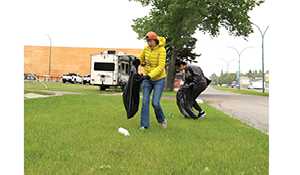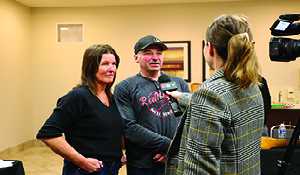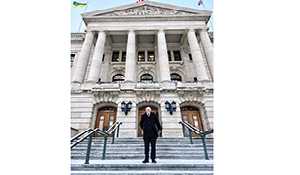Local businesses weigh in on what they need to see from the next federal government
April 21, 2025, 10:03 am
Kara Kinna
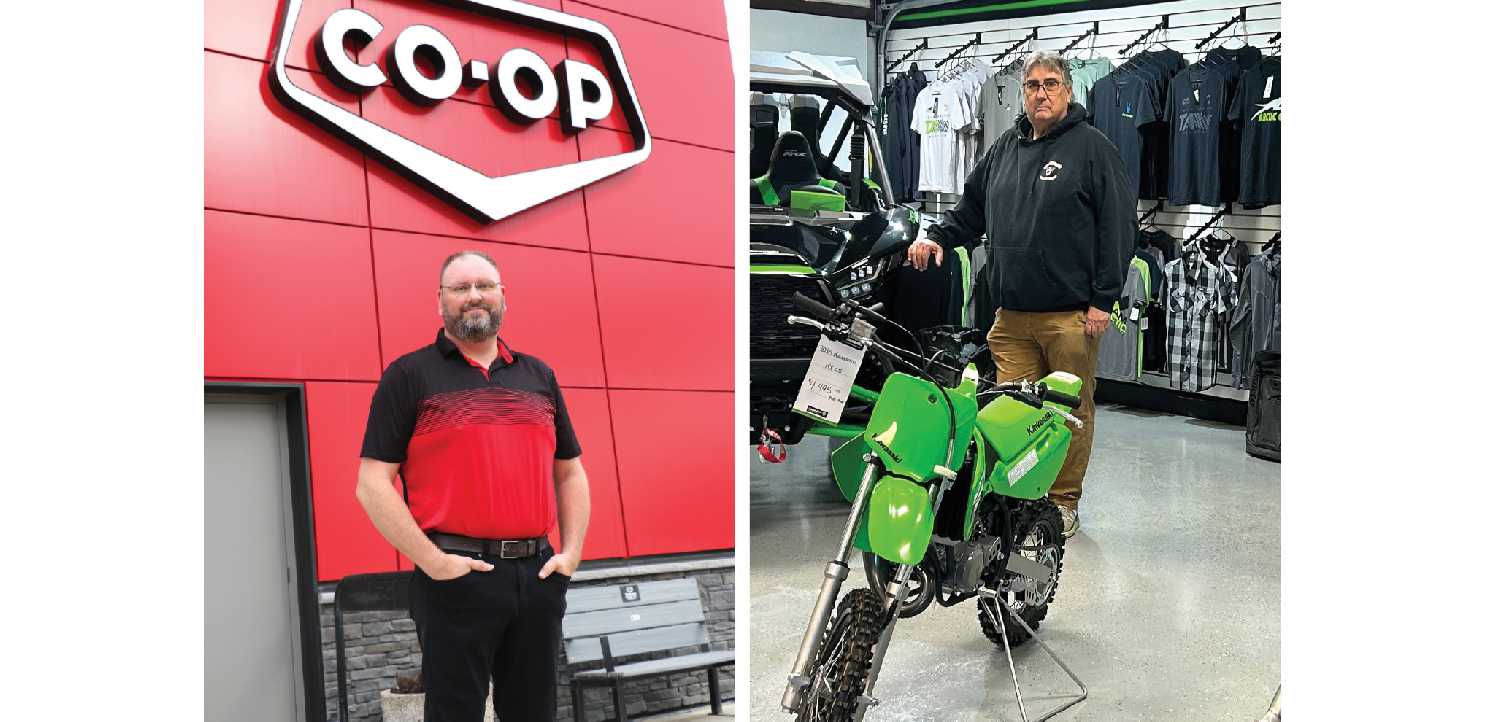

Local businesses are weighing in on what they’d like to see from the next federal government after the election on April 28.
When asked what the big issues are facing small businesses right now, Tyler Thorn, the owner of Celebration Ford, says federal policies that hurt Western Canada are an issue.
“I think the number one thing for me is I think the Liberals have sort of forgot about Western Canada and they have policies that are not conducive to supporting the economy in Western Canada and I think a new government would address that and that would certainly be good for, I think, all business west of Winnipeg,” Thorn said.
“That would be my number one issue. We’ve got to get a government in there that governs the whole country, not just Ontario and Quebec, so that’s top of mind. You really don’t want to invest further into businesses and real estate and other things in Western Canada when you don’t have any support from the government. It makes it very difficult to view those as good investments?”
Thorn cites the carbon tax and capital gains tax, and Canada’s reliance on the U.S. as other issues facing local businesses and the economy.
“I think all of those issues—the carbon tax, how much that costs business owners, and certainly the capital gains tax is a big one as well. As our business population ages, you know those people are looking to retire and exit and that’s a big issue for them.
“I think we are in a situation now where we are so reliant on the U.S. because we’ve spent 10 years not investing in Canada and investing in manufacturing, processing, and building pipelines the to the east and west coast. We are so reliant on the U.S. and I think that’s really come to light in the last 30 days. As a country were not as productive as we should be and a lot of it is due to government policy and tax policy. Who wants to work their ass off and give 50 per cent of what they make to the government, or 50 per cent-plus.
“I think we need a government that’s going to be a little more business friendly and let us keep more of our own money, or I think you will start to see a real exit of capital out of Canada.”
What does Thorn think the government needs to do to change things?
“Well I think we need some tax relief number one,” he says. “We need a more competitive income tax structure for businesses, I think we need less regulation.
“The carbon tax is another one. The provincial government has stepped up, but I think we need to get rid of that carbon tax—not just pause it, but get rid of it. That’s causing some inflation across the country.
“The obvious one is who’s going to have to deal with Donald Trump, but I’m not sure if it matters who will be our Prime Minister, they’re going to have their hands full with that one. But certainly that’s going to be a big issue too, dealing with that tariff situation and that will impact every small business in a different way. It’s certainly going to have a significant impact on us here I think.
“So we need somebody in power who can manage that situation.”
Jason Schenn, the General Manager of Borderland Co-op, says affordability is the biggest issue facing business right now.
“Probably the biggest thing is affordability. We are in a business where it’s all necessity. People need food, they need fuel, they need those products to keep their homes maintained, and farm supplies, all those kinds of things. Those are all necessity kind of items, but when afford-ability across the board becomes an issue, all those things get compromised.
“Disposable income ends up being a huge thing in terms of how people operate.
With food it’s a difference between people having steak or hot dogs. In convenience stores maybe they don’t pick up the extra bag of chips or sandwich or whatever it is on their way to wherever they’re going, they maybe just pack their own lunch.
“And of course when you start having a major contraction in terms of that, it affects margins contributions and everything else which affects the business which affects our ability to employ people. It just has that cascading effect.
“From a government perspective where the federal government comes in, I’d really like them to put the effort into the every-man affordability. Some of these programs are great from an investment perspective, but when I think about the people we have and the business we’re in, a lot of those people don’t have that disposable income to begin with to be able to take advantage of all the tax savings that are easily accessed by higher level incomes and if you’ve got cash in the bank. They are all positive, they help with different segments, but those are generally not the people who are deciding what they are having for supper, it’s not that granular, it’s whether not I go on a holiday or whether or not I get a new camper for a lot of those kind of higher level incomes.”
Schenn says things like the carbon tax have made it hard to keep affordability in check.
“That’s number one, when you think about that carbon tax impact,” he says.
“We’re big for our local geographic area, we’re a fairly large organization with lots of sites, but when you think about it on a Western Canadian or Canadian scale, we’re just a drop in the bucket of the overall impact.
“We’re still a very local kind of a business, and when you think about our cheque that we have to cut to the governmental, in any given month, with the carbon tax it’s been around $450,000 a month.
“So you think about that $450,000 of our members’ money, our communities’ money, you know people that work really hard for their money, and that is just going into the government coffers. They say they send it back and then some, but that’s hard to believe when people get a cheque for $250 or something like that quarterly. It’s had a huge impact and that doesn’t even include when they talk about the downstream things like heavy emitters, the refinery where we’ve been paying or the clean fuels standards that also have a lot of cost tied to them.
“It’s a double edge sword, because on one hand from an environmental perspective good stewardship is important, making sure that you are making a good product that is as sustainable that you can make it, that’s an important thing. But a lot of these levies and incentives, they are not as much about rewarding the behavior to get there, it’s more about incentivizing feel good projects more so than the real good.”
Schenn says policies like that have driven up costs.
“Taxes and levies, no matter where they apply them, the government as a whole at the federal level can say they are taxing the heavy emitters, but the fact of the matter is that every corporation out there, whether it’s us with our local members or they are paying shareholders or other entities, people’s retirements and all kinds of things are connected back to how organizations do financially.
“It (the cost) has to get passed along. There is not enough margin in the game to be able to really absorb. It’s got to come out of somewhere. Every tax, every levy ends up in the consumers’ hand at the end of the day regardless.”
Schenn says he’d like to see a federal government that scraps things like the carbon tax and instead provides incentives for environmental initiatives.
“I definitely think they should be eliminating the carbon tax and looking at different types of incentives for improving environmental standards rather than it being a tax or a levy,” he says. “I feel like those just get lost and redistributed in poor ways.
“From that perspective, any time you can put more money back in people’s pockets, whether it be a farmer or any family, they reinvest that 100 times over in their communities. To me it makes sense to make sure that people have more money in their pockets so they can actually take advantage of supporting their local businesses wherever they may be. And whether that’s us or another business on main street, in our communities, it doesn’t matter.
“We are a big operation, we do have a lot of people and we do pay a lot of taxes in the community, but so does everybody else.
“Having that ability to support your local community is super important. If that contracts then it just sends everyone out of town and you are sending economic impact away too.”
He says affordable housing is another big issue that the federal government needs to tackle.
“Housing is the other big thing, I know that’s been a big topic in Moosomin with the $30,000 incentive that’s out there. But it’s about trying to get affordable housing. That’s been a bit of a struggle.
“We have some places but they are still not affordable. You think about a front line employee and their family, and $1,800 a month is too much for a place to live. Not everybody has mine jobs. I think that gets forgotten, and those individuals still provide a lot of value to our communities. So I don’t think it’s being incentivized in a way that is beneficial.
“If you can incentivize housing for homes that are affordable rather than just throwing money out that really only benefits and investor, they should look at that. People need to have a return on investment, that’s part of it too, but if the government is getting involved, I think they need to get the cost down.
“We’ve looked at a few different ideas on how we can attack that problem ourself through Borderland Co-op, and it’s not easy because when you start getting into materials and cost of labour and all these things that are constantly rising, and you add tariff threats as well, it’s almost impossible to build a house for under $300,000 when you include the lot and all the trades that need to go into it.
“And that’s where I’d kind of like to see, if the government was going to fund something for housing, fund something from that end. Build something that is affordable and then fund it to help make it affordable, and hopefully the market doesn’t gobble up too much of it—that’s always the risk.
“I think that’s where the government has a place to play where they can subsidize some of that type of housing to get the cost down and actually put some real housing down on the ground.
“But beyond that it’s just about putting money in people’s hands so they can decide what to do with it for the most part.”
Stan Langley, the owner of Universe Satellite in Rocanville things like the carbon tax and Western alienation are things the next government needs to take seriously.
“The GST and the Carbon Tax are two big things,” he says. “The thing that worries me is that the consumer carbon tax that Carney has taken away is just going to be a hidden tax. Now we are not going to see the tax, he’s put it on the refineries an other industry. The refineries are just going to increase the prices so now they are still going to collect just as much carbon tax but they are going to turn around and they are not going to give it back now.
“I don’t know how Carney has become so popular because if people are that blind that they can’t see what has happened in the last 10 years, how the West has been alienated and everybody else really—I just can’t believe that you can do such a horrible job and be so dishonest and get away with it.”
He says it’s extremely important for Canada to start doing better at supporting its own businesses and industries.
“We need to keep our money in Canada. We have to diversify,” he says. “The pipelines are one big thing. We’ve got tons of manufacturing that could be done here. Cross-provincial trade is a big thing. We can’t even trade amongst our provinces so how do you expect to trade with another country. We’ve got to get that fixed and get trading.
“You should have free trade amongst the provinces. We have to capitalize on what we have in this country amongst ourselves. And shipping oil to the United States so they can pump it back to Montreal makes no sense. We need to put our own pipelines in.
“If you get a pipeline going across Canada, it’s going to take a lot of people to build a pipeline. Wapella is a good example. Look at how many people in Wapella have made a living on pipelines all their lives, and that money all comes back home to be spent here. And the more money we can keep in Canada, the better off it’s going to be for small business. If it’s made here, chances are they are going to spend it here, but if we are shipping it away, then we are not going to have that.”













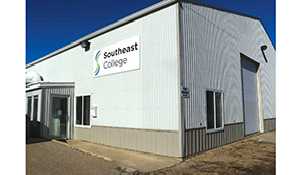
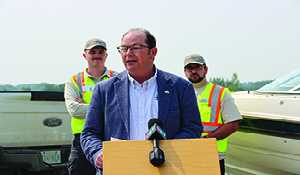













SM.jpg)
